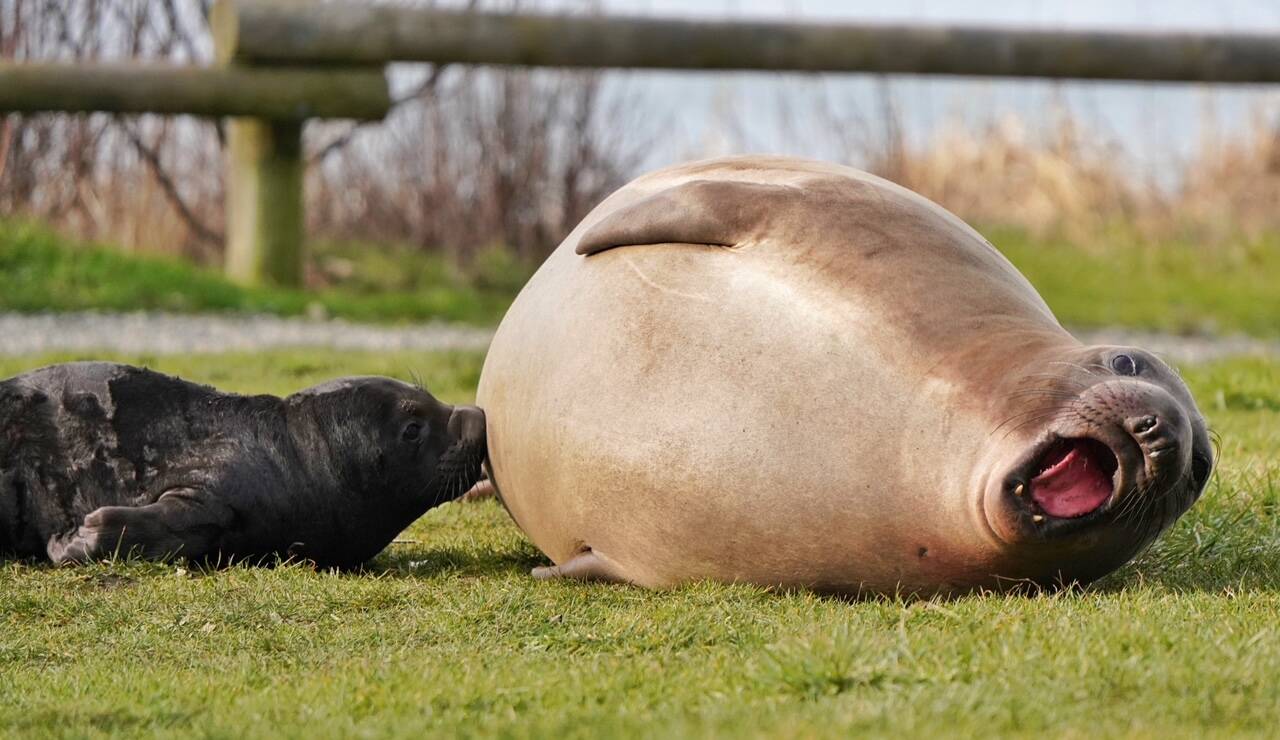Ellison, an elephant seal that has occasionally shown himself on Whidbey’s beaches, is becoming a bit more notorious in Puget Sound.
Garry Heinrich, response coordinator for the Central Puget Sound Marine Mammal Stranding Network, a partnership between the Langley-based Orca Network, wildlife veterinarians and biologists and National Oceanic and Atmospheric Administration Fisheries, received a report last Wednesday about Ellison on Bainbridge Island. That means the seal hasn’t left Puget Sound for nearly a year, which is unusual.
Elephant seals tagged in California are sometimes found in Alaska and Japan. They have quite the range, Heinrich said, and since he started as a volunteer for the Stranding Network over a decade ago, elephant seal presence has increased significantly.
Five pups have been born in the last 10 years. Each carries a name, Heinrich said, because they show up in predictable areas “like clockwork.” One of these areas is Whidbey beaches along Saratoga Passage.
In his position, Heinrich is responsible for coordinating help for distressed marine mammals in Island and Skagit counties and parts of Snohomish County. He’s the go-to person for local media and others when it comes to stories about seals, sea lions and elephant seal shenanigans.
When Elsie Mae, a descendant of a population of northern elephant seals on Guadalupe Island, first showed up five years ago, she was causing problems in Anacortes.
“She’s quite the social butterfly,” Heinrich said. “She’s been known to crash weddings and to go to birthday parties.”
Heinrich and his team relocated her from Anacortes to Polnell Point on Naval Air Station Whidbey Island. Immediately, she swam back to Anacortes.
Elsie Mae had returned quicker than the response team could have driven, Heinrich said.
Elephant seals have site fidelity, he said. They like to return to the same place, be it for safety or food availability. Some beaches in California see hundreds of them for this reason.
Elsie Mae posed the question – what should the response team do now?
The seal and the network reached an amicable conclusion. The late Phil Sorenson, a Stranding Network volunteer, coordinated a group that shows up every time Elsie Mae does, protecting her and educating the public to this day.
A similar group has formed in British Columbia, Heinrich said, protecting Emerson, Elsie Mae’s son.
“(Elephant seals are) community builders in a way,” Heinrich said. “It developed a community of people who didn’t know each other, but they had a purpose to come together to keep the animal safe.”
Heinrich spent 20 years teaching math and science in Southern California before moving up to Whidbey Island in 2010. His love of marine mammals harkens back to his time as a trainer at Marineland of the Pacific, a Los Angeles oceanarium that closed in 1987.
Calls come into the Stranding Network daily, he said, but not all of them are emergencies.
“A gal called me yesterday. She said a seal looks like it’s dead and it’s floating in the water with its slipper stuck out in the air, and can’t figure out what’s wrong with it,” he said. “I’ll explain that behavior is perfectly normal. They’re just resting and soaking up the rays.”
Beached whales are very rare, he said. The typical incident is dead or injured seals, porpoises and sea lions. This year, there have been 51 incidents.
Response could be anything from seal monitoring and educating the public to facilitating a veterinarian to transfer the animal to a facility such as SR3 or Wolf Hollow Wildlife Rehabilitation Center to onsite euthanasia.
Heinrich also collects data to see trends across the region.
Marine mammals can be windows to the ocean’s overall health, he said, which can be an indicator of the health of the planet. Much can be learned by monitoring marine mammals and studying their behavior.
“I’ve been teaching all my life,” he said. “The oceans and the creatures and the life that’s in it are what keeps this world going.”
Much of what people have learned about the health of the planet has come from studying animals, he said, and as a byproduct people learn about their unique intelligence and their individual personalities.
“I think I learned something new every time I see elephant seals,” he said.
The increasing elephant seal presence, for instance, is likely an indicator of warming water temperatures.
Should a beachgoer come across a seal or other marine mammal, Heinrich encourages them to give it space.
Most of the time it is taking a break, he said. Beaches are also nurseries for seals, and mothers will leave their pups to go hunt.
“A pup is born, and for the next few weeks it doesn’t even know how to swim,” he said. “They are cute. They cry. They sound like a baby crying for his mom, but they’re not in any way at risk.”
Heinrich tells people that they are fine and safe, and the mother is watching. If people interfere, the mother may not feel safe anymore and abandon the pup.
“Don’t do anything to them,” he said. “Call my number, and I’ll get myself or one of my volunteers out there to handle the situation.”
The Central Puget Sound Marine Mammal Stranding Response line is 1-866-ORCANET or 949-233-2822.
Ultimately, response coordination is a labor of love, Heinrich said.
“I’m retired,” he said, “but I can’t think of a better way to spend my retired time than looking after these animals in the water.”



